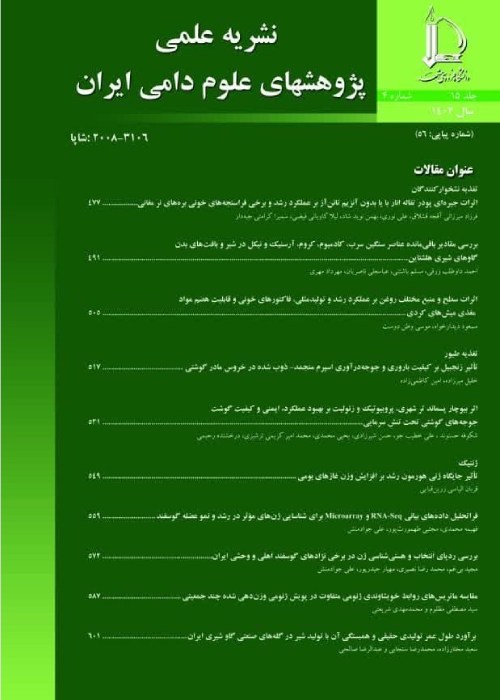Effect of Cynara Scolymus on Microbial Population, Liver Enzymes and Immune System in Broiler Chickens under Cold Stress Condition
Medicinal plants play an important role in maintaining the health and performance of the poultry during stress. One of the most important medicinal plants is artichoke. Artichoke, the scientific name of Cynara scolymus and the Latin name Artichoks, is an herb of the chicory family of the oldest medicinal plants. The extract of this plant improves arthrosclerosis and liver damages. This experiment was conducted to investigate the effect of Artichoke medicinal herb on growth performance, microbial population, liver enzymes and immune response in broiler chickens under cold stress condition in a completely randomized design.
In this experiment, 400 one day old broiler chicks of Ross 308 were used in a completely randomized design with five treatments, four replicates and 20 chicks in each replicate. Experimental treatments were control (basal diet), antibiotic (basal diet plus 0.0015 percent antibiotic virginiamycin), aspirin (basal diet plus 0.2 percent aspirin powder), 10 and 20 g/Kg artichoke powder. During the experiment (42 days), the chicks had free access to water and feed. The broiler chickens were exposed to a temperature of 32ºC at one-day-old, with stepwise reductions to 25 ºC, 20 ºC and 15 ºC on days 7, 14, and 21, respectively. At this point, a temperature of 15 ºC was maintained until the end of the experiment. At 21 and 42 days of each experimental unit, two birds were selected and the gastrointestinal tract opened in an aseptic condition adjacent to the flame. Using pre-sterilized aluminum foil pieces, 1 g of ileal contents was removed and added to tubes containing 9 ml of phosphate buffer saline and transferred to the laboratory to determine the population of Lactobacillus, Bifidobacterium and Escherichia coli (E. coli). The number of bacteria per gram of sample was calculated. At the end of days 21 and 42, the breeding period after two hours of starvation from each experimental unit of 2 birds were randomly selected and 2 ml blood was taken via a wing vein. Serum samples were isolated after blood coagulation and transferred to the micro tube and centrifuged for 10 minutes. The enzymes activity of Alanine Aminotransferase (ALT), Aspartate Aminotransferase (AST) and Alkaline Phosphatase (ALP) were measured. To assay the primary and secondary antibody responses against sheep red blood cell (SRBC), at 16 and 23d of age, 2 birds/replicate were immunized intramuscularly with 0.5 mL 10% SRBC. Blood samples were obtained from the brachial vein at 7d following each injection (days 23 and 30). Antibody titers against Newcastle virus were measured in serum samples by hemagglutination inhibition assay.
The results indicated that the population of E. coli was not subjected to experimental diets at 21 days. Lactobacillus population was subjected to experimental rations at 21 days. The effect of experimental diet on Bifidobacterium population was significant at 21 days of age. The experimental diets containing antibiotics and aspirin reduced and increased Bifidobacterium population respectively. The effect of experimental diets on the population of E. coli was significant at 42 days of age. Both levels of artichoke reduced the population of E. coli by comparison with the control and antibiotic groups. The diet containing aspirin and antibiotics also reduced and increased the E. coli population, as compared to the control group. The effect of experimental diets on Lactobacillus population was significant at 42 days of age. Antibiotic diet lowered the Lactobacillus population compared with other experimental groups. The effect of experimental diet on bifidobacterium population was significant at 42 days of age. The diets of 2% of artichokes and antibiotics increased and decreased bifidobacterium population respectively. One reported in a study thatevaluated the phenolic compounds of leaf extract and their antimicrobial activity that the compounds in the plant's extract such as chlorogenic acid, cinnarin, luteolin-7 rhinosinus and sinarocide showed high activity for combat with organisms. Experimental treatments had significant effect on activity of liver enzymes. The treatments 2% artichoke and aspirin were reduced activity ALT at 21 days. The treatment 2% artichoke reduced the amount of AST enzyme compared to control and other experimental diets. The experimental diets had no effect on ALP at 21 days of age. The effect of experimental diets on blood enzymes at 42 days of age was not significant. The result of a study showed that artichoke extract reduced the concentration of AST and ALT in broiler chickens. Kraft (1997) stated that watery extract of artichoke significantly reduced the concentration of AST, ALT and ALP compared to control group. The effect of different diets on the antibody titer against SRBC in 2 stages (23 and 30 days) and Newcastle disease (at 7 days of injection and 7 days after blood donation) was not significant. According to the results of the present study, Rahimi et al. (2011) reported that the antibody produced against RBC of sheep between rations (containing 0.1% garlic and control) in both temperature conditions (normal temperature and cold temperature to create ascites) was not meaningful. The results of this study showed that the diets containing each plant and their interaction did not have a significant effect on the antibody titer against Newcastle disease. Feed intake and body weight were increased and feed conversion rate was decreased in artichoke powder received groups in comparison with other treatment.
Antibiotics are used to prevent bacterial infections and improve the digestive system's health in the poultry diet. In this research, which was carried out under cold conditions, virginiamycin antibiotics not only had no positive effect on the ileum microbial population, but also compared with control treatment reduced beneficial bacteria and increased harmful bacteria. It is concluded that the inclusion of 2 percent of artichoke in broiler diet, under cold stress conditions had positive effect on microbial population, liver enzymes and immune response in comparison with control treatment and antibiotic treatment, therefore it can be recommended.
- حق عضویت دریافتی صرف حمایت از نشریات عضو و نگهداری، تکمیل و توسعه مگیران میشود.
- پرداخت حق اشتراک و دانلود مقالات اجازه بازنشر آن در سایر رسانههای چاپی و دیجیتال را به کاربر نمیدهد.



